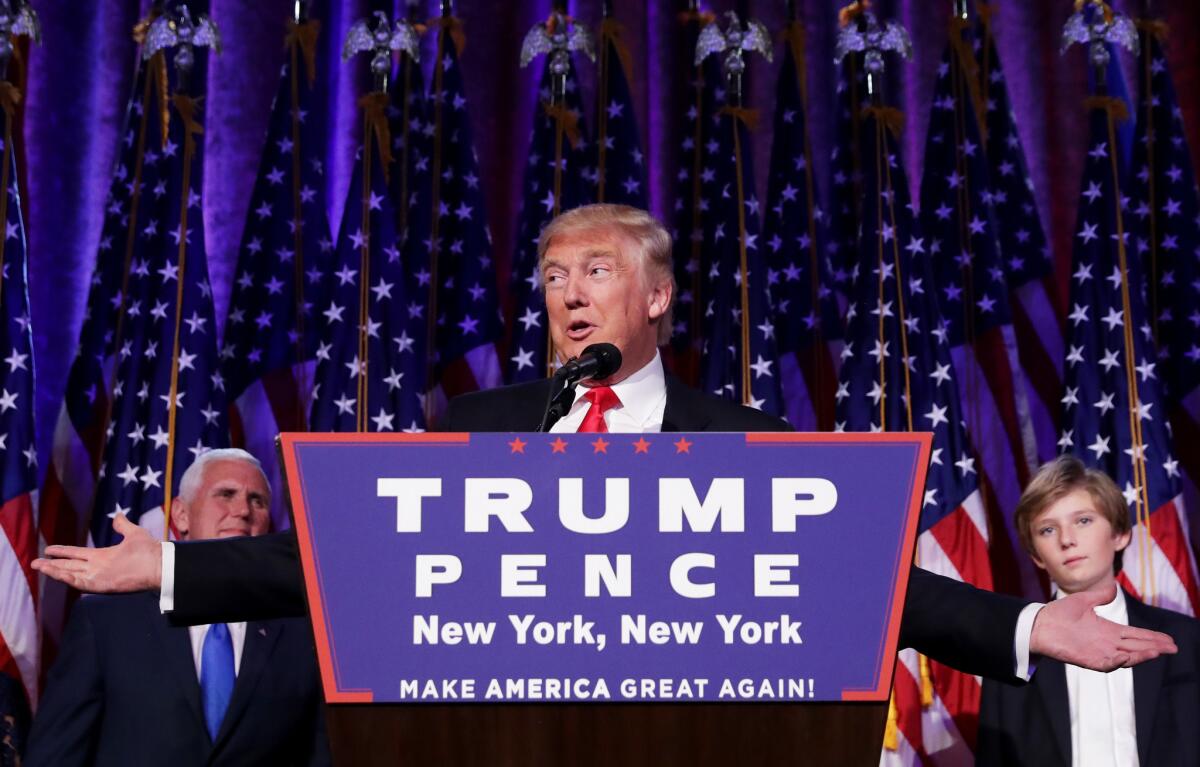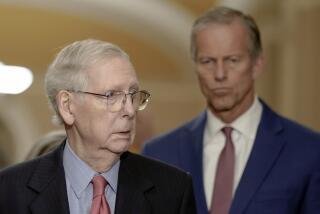Now Trump has his chance to change Washington. But it might change him instead

On Wednesday morning, Washington awoke to a question that few, even in Republican circles, had spent much time thinking about in the past several months: What will a Donald Trump administration do?
Democrats were shell-shocked. And many Republicans pondered how to deal with a freestyle chief executive who comes to the office with few well-defined policy positions beyond a hard-line stance on immigration.
As Republican leaders publicly celebrated the shift in power, some in the rank and file, along with allied lobbyists and staffers, worried about how it would play out. They hung on to the reassuring, calm – even gracious – Trump victory speech as a sign he could be more statesmanlike than he was on the campaign trail. Then they recalled his campaign.
“Anyone who thinks he is going to magically change is delusional,” said GOP strategist Kurt Bardella, who refused to vote for Trump in Tuesday’s election. “The confrontational style of Trump and those who have been a part of his team will continue when he assumes the presidency. There are going to be a lot of situations where the Trump administration is at odds with its own party in Congress.”
Trump’s plans on issues such as taxes, the federal budget, healthcare and trade have been vague. Those on Capitol Hill with an expertise in immigration confidently predict that the wall he promises for the Mexican border will never be built. Similar skepticism surrounds his plan to deport millions of immigrants in the U.S. illegally.
Trump has vowed not to touch entitlements like Social Security and Medicare that congressional Republicans have tried for years to cut. The New York businessman’s announcement on election night that he would pursue a burst of infrastructure spending immediately unsettled some of the fiscally conservative lawmakers who endorsed him.
Even the unity that Trump and congressional Republicans displayed on repealing Obamacare seems fragile. Neither has offered a workable plan for replacing it.
“Now that they have all the power in Washington they ever imagined they could get, it is like the proverbial dog chasing the bus,” Norm Ornstein, a scholar at the right-leaning American Enterprise Institute, said of Trump and the lawmakers who endorsed him. “They’ve caught it and don’t know what to do with it.”
Still, Trump will be empowered to make good on his promise to erode – if not outright eliminate – many of President Obama’s landmark achievements. He has called global warming a hoax and has promised to reinvest in coal. Trump and Republican leaders are looking to implement deep corporate tax cuts that Obama has resisted. The conservative majority on the Supreme Court will quickly be restored.
The prospect of it all had some Obama staffers in tears as they gathered in the Oval Office on Wednesday morning. Obama scanned their faces for a moment before offering a word of comfort.
“He basically said, ‘This doesn’t undo what you have done,’” said one senior staffer. Obama also urged them not to give into the passions of the moment but rather stay focused on the tasks at hand – hosting Trump at the White House on Thursday and setting in motion a smooth transfer of the levers of government.
“We are now all rooting for his success in uniting and leading the country,” Obama said later in remarks to the nation from the Rose Garden. “The peaceful transition of power is one of the hallmarks of our democracy. And over the next few months, we are going to show that to the world.”
As he spoke, more than 100 White House staffers filled the colonnade and lawn to hear his pep talk – for them and the country. Obama had begun working on his address before he called Trump about 3:30 a.m.
Progress happens in a zigzag line, he said, not a straight one. “That’s the way politics works sometimes,” he said. “We try to persuade people.... We learn from our mistakes.”
The Obama administration, according to a senior aide, is now focusing on making sure the public and the incoming administration understand what is working — and what Americans may miss if it is taken away.
“In a way, everything changed and nothing changed last night,” said Sen. Christopher S. Murphy (D-Conn.). “We have a new president – one that half the country didn’t want. But let’s be honest: Had Hillary won, we would still have a president that half of America didn’t want.”
The Trump transition is already well underway, and insiders are watching it closely for signs of how he will govern. Trump must reconcile his preference for winging it with the need to quickly fill 4,000 political appointments, forge a close working relationship with Congress and learn the intricacies of how power is wielded across the vast federal bureaucracy.
One of his favorite pledges is to “drain the swamp” that is Washington, but the swamp is not easily drained.
“Every president known to man talks about how they are going to change it,” Bardella said. “They find the institution is more powerful than one man.”
The legions of lobbyists Trump has suggested should be run out of town will probably only multiply in their number and influence. A new administration always brings new opportunities for the “third house” inside the beltway. There are new visions to be implemented, and the people equipped to do that often charge by the hour.
A question looming over lunchtime conversation at Washington’s steakhouses and private clubs is how much sway Trump gives to Vice President-elect Mike Pence, a seasoned lawmaker positioned to smooth relations with Republican leaders. Competing for influence in the Trump administration will be the advisors from the so-called alt-right, who have openly schemed to dethrone the GOP leaders Pence counts as allies.
House Speaker Paul D. Ryan and Senate Majority Leader Mitch McConnell tried to wave away any notion that they were worried. McConnell invited Pence to the weekly GOP policy luncheons in the Senate, which former Vice President Dick Cheney used to attend as a liaison for George W. Bush.
McConnell also said he told Trump that he’d like them to work out any disagreements in private.
“We are going to be enthusiastically supportive almost all the time,” McConnell predicted. But he also suggested that Trump would be best served by sidestepping Congress altogether and moving through administrative or executive action, when possible.
But when talk turned to Trump’s immigration plans, including building a wall and mass deportations that could require billions of dollars in congressional authorizations, McConnell was circumspect.
“I’m not going to discuss the immigration issue today,” he said.
Los Angeles Times staff writers Michael A. Memoli and Christi Parsons in Washington and Chris Megerian in New York contributed to this report.
evan.halper@latimes.com
@evanhalper
More to Read
Start your day right
Sign up for Essential California for news, features and recommendations from the L.A. Times and beyond in your inbox six days a week.
You may occasionally receive promotional content from the Los Angeles Times.








